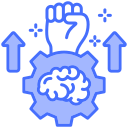Personal resilience is the ability to adapt and thrive through life’s challenges and changes. Developing resilience is not about avoiding stress or adversity but about building the skills and mindset to cope, recover, and grow from difficult experiences. This page explores four key pathways of personal development designed to fortify your resilience, empowering you to confidently face setbacks and seize new opportunities with clarity and composure.
Self-Awareness and Mindful Reflection
Self-awareness is foundational in the journey towards resilience. Through mindful reflection, individuals gain insight into their own emotional triggers and habitual patterns of reaction. Fostering this awareness involves observing and naming emotions without judgment, which allows for greater choice in how to respond. Over time, self-awareness develops into a powerful tool for identifying areas of strength as well as opportunities for growth, enabling a more intentional and resilient approach to life’s stresses.
Emotional Regulation and Stress Management
Effectively managing one’s emotional responses is an essential component of resilience. Emotional regulation involves deploying strategies that enable you to stay calm, think clearly, and maintain balance during stressful situations. Techniques such as deep breathing, positive self-talk, and reframing negative thoughts can help reduce the intensity of emotional reactions. By practicing these methods consistently, you can build resilience by ensuring that emotions inform rather than control your actions, leading to improved decision-making and well-being.
Empathy and Supportive Relationships
Empathy is a key ingredient in forming authentic connections and building supportive relationships, both vital for resilience. By understanding and sharing the feelings of others, you nurture trust and create a network that can provide comfort and perspective during difficult times. Strengthening empathy not only enhances your support system but also enriches your sense of belonging and community. Engaging empathetically with others allows you to both offer and receive support, amplifying resilience on a personal and collective level.
Previous slide
Next slide

Cognitive Flexibility: Adapting to Change
Embracing adaptability means cultivating an openness to new experiences and being prepared to change direction when events do not unfold as expected. Rather than clinging to fixed outcomes or old habits, a resilient individual can accept uncertainty and ambiguity, finding creative ways forward amid chaos. By practicing adaptability, you harness the capacity to recover quickly from setbacks and view challenges as opportunities for growth rather than threats, thereby continually strengthening your personal resilience.
Purpose and Values: Building Inner Strength
01
Clarifying Your Core Values
Identifying and clarifying your most important personal values provides stability in turbulent moments. When you understand what truly matters to you, decisions become clearer and motivation increases. By reflecting on past experiences that have brought fulfillment or pride, you can discern the principles that resonate most deeply. Anchoring your actions to these core values creates consistency and integrity, which forms a foundation of inner strength to draw upon during hardship.
02
Setting Meaningful Goals
Purposeful, meaningful goals direct effort and imbue life with a sense of accomplishment. Setting and pursuing such goals gives you something positive to focus on, encouraging perseverance even when obstacles arise. By choosing goals that align with your values and aspirations, you create intrinsic motivation to persist through setbacks. The process of striving for meaningful outcomes cultivates discipline, fosters optimism, and helps you measure progress, all of which are critical elements of resilience.
03
Cultivating Optimism and Hope
Optimism and hope are powerful psychological resources that sustain motivation under pressure. By maintaining a positive outlook and focusing on possible solutions rather than insurmountable problems, resilient individuals generate the energy needed to persist in adversity. Cultivating optimism involves recognizing setbacks as temporary and surmountable, and drawing upon hope to envision better outcomes ahead. This mindset enlivens your capacity to recover, adapt, and keep moving forward in alignment with your highest ambitions.
